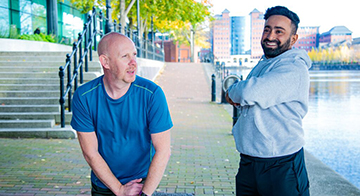It’s no secret that men are at higher risk for many serious diseases, including heart disease, lung cancer, and HIV1 – as well as facing unique health problems like prostate cancer. And we know that men are prone to depression and mental health issues too.
But, while it’s not always the case, men can also be reluctant to seek help for health issues, or even acknowledge when there may be a problem. What’s more, we know that many conditions have gone undiagnosed, or treatment has been left later than usual, due to the disruption caused by the COVID-19 pandemic.2
“It’s essential to see a doctor if you have any symptoms you’re concerned about – and to attend appointments for regular screenings too; they really could be life-saving."
– Dr Robin Clark
To improve men's health, it's important to raise awareness about preventive action and regular healthcare for men of all ages, remembering that early intervention saves lives. The message to men today is that it’s crucial to take notice of what’s going on in your body and mind.
Get to know your ‘normal’
Picking up on problems and accessing treatment at an early stage, increases the odds of a speedier recovery. On the flip side, delaying medical intervention can mean minor problems become more serious and more difficult to treat. It’s crucial to get to know what’s ‘normal’ for you – whether that’s sleeping patterns, your weight, or your bowel movements – and seek help if something changes.
“Men can feel awkward talking about their problems, but talking to friends, family, professionals, and even work colleagues can prove really beneficial."
- Dr Robin Clark
Depending on your problem, your doctor will usually be your first port of call – although a pharmacist may be able to help with minor illnesses.
Dr Robin Clark, Medical Director for Bupa Global & UK says: “It’s essential to see a doctor if you have any symptoms you’re concerned about – and to attend appointments for regular screenings too; they really could be life-saving. There’s no need to be embarrassed about any issues either - the doctors across our health clinics are trained to make sure they’re able to put people at ease if they feel anxious, and rest assured, we’ve seen it all before!”
Prioritise exercise and keep moving
Keeping active is beneficial for both your physical and mental health. Regular exercise can reduce your risk of major illnesses, such as coronary heart disease, stroke, Type 2 diabetes, and cancer – and can lower your risk of early death by up to 30%.3 Bupa Global’s Executive Wellbeing Index 2021 found that 42% of respondents worldwide, listed exercise as their preferred mental health coping strategy.4 But it’s not just about doing a home workout or taking out a gym membership: walking, playing outside with your children, and even gardening are all great ways to get your blood pumping. For most people, the easiest way to lead a more active lifestyle is to make activity a part of everyday life, like walking to work or trying to use the car less. However, the more you do, the better, and taking part in more intensive activities such as sports can offer further benefits. If you have limited mobility, it may not be so easy to access exercise in quite the same way consider exercising in water, resistance bands, stretching exercises or yoga.
Dr Robin says: “For physical activity to benefit your health, you need to be moving quickly enough to raise your heart rate and make your breathing faster. This is called moderate-intensity activity. An activity where you have to work even harder is called vigorous-intensity activity, and taking this sort of exercise - which increases your heart rate and breathing quite a bit - has even more benefits.”
It’s good to talk
It’s important to have people who you can turn to in times of ill health or worry. Nothing can replace the advice of doctors, but a support network of friends and family can help you to stay healthy, and spot problems early. Finding someone who you can talk to – whether that’s a therapist, a support group, or your doctor – can be the first step to overcoming any potential problems and leading a happier life.
Dr Robin comments: “Men can feel awkward talking about their problems, but talking to friends, family, professionals, and even work colleagues can prove really beneficial. Asking for support from your workplace, for example, can be an important step in tackling mental health issues – whether that’s through the provision of practical assistance from work, or just ensuring you have time and space to make and attend the appointments you need.”
Make small changes
It’s important to take small steps and make incremental changes to your lifestyle to make sure you’re able to stick to your new routine.
Dr Robin says it’s important to set realistic goals; “The first step to improving your health is to take stock of where you are now. Regular blood pressure, blood sugar and cholesterol tests can help pick up potential problems early, and it’s crucial to attend any preventive screenings you may be invited to.”
When using the term ‘men’ in this article, we recognise this advice will be pertinent to cisgendered men, as well as trans and non-binary individuals with other gender identities, and who have biologically male anatomy, such as the prostate gland. If you are transgender or non-binary then your medical needs might be different. Please ensure you speak to your medical professional to access the healthcare appropriate to you.




